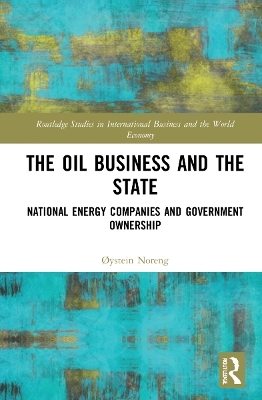
The Oil Business and the State
National Energy Companies and Government Ownership
Seiten
2021
Routledge (Verlag)
978-0-367-86014-1 (ISBN)
Routledge (Verlag)
978-0-367-86014-1 (ISBN)
National oil companies are big business with about eighty percent of the world’s proven oil reserves, and they are crucial to the world’s energy supplies.
National oil companies are big business with about 80 percent of the world’s proven oil reserves, and they are crucial to the world’s energy supplies. They are giants, some of the world’s largest companies, measured by market capitalisation, cash flow and investment. Little is known about their modus operandi, how they make decisions about investment and production or about relations with their government-owners. However, it is known that they conduct business with a political mandate, often with multiple long-term objectives, broadly defined and hard to quantify.
Unclear mandates give national oil companies leeway to pursue their own distinctive interests, apart from those of the government-owner. As investors, governments are less zealous than private investors. They generally observe multiple objectives, not only return on capital. Therefore, the senior management of national oil companies enjoy more discretionary power and consider longer time horizons than their counterparts in the private sector. The Oil Business and the State explains the practice of state ownership in a capital-intensive industry with high risks and high return, and how these companies act in a market with imperfect competition. This book looks to give readers more insight into the oil industry, into the background of oil exporting countries as well as the economic and political challenges confronting them, including problems of state ownership. The book discusses wider consequences of China replacing the United States as the world’s leading oil importer.
It will be of interest to researchers, academics and students in the fields of international business, management history, corporate governance, political economy and economic development of oil-rich countries.
National oil companies are big business with about 80 percent of the world’s proven oil reserves, and they are crucial to the world’s energy supplies. They are giants, some of the world’s largest companies, measured by market capitalisation, cash flow and investment. Little is known about their modus operandi, how they make decisions about investment and production or about relations with their government-owners. However, it is known that they conduct business with a political mandate, often with multiple long-term objectives, broadly defined and hard to quantify.
Unclear mandates give national oil companies leeway to pursue their own distinctive interests, apart from those of the government-owner. As investors, governments are less zealous than private investors. They generally observe multiple objectives, not only return on capital. Therefore, the senior management of national oil companies enjoy more discretionary power and consider longer time horizons than their counterparts in the private sector. The Oil Business and the State explains the practice of state ownership in a capital-intensive industry with high risks and high return, and how these companies act in a market with imperfect competition. This book looks to give readers more insight into the oil industry, into the background of oil exporting countries as well as the economic and political challenges confronting them, including problems of state ownership. The book discusses wider consequences of China replacing the United States as the world’s leading oil importer.
It will be of interest to researchers, academics and students in the fields of international business, management history, corporate governance, political economy and economic development of oil-rich countries.
Øystein Noreng is Professor Emeritus in the Department of Leadership and Organizational Behaviour at BI Norwegian Business School, Norway.
1. State Or Market?—Both Or Neither? 2. A Brief Historical Overview 3. The First Wave: Colonial Oil Importers 4. The Second Wave: Oil Exporters 5. The Third Wave: Russia And China In The 21st Century 6. Intentions And Design 7. Capturing Economic Rent 8. Oil Risk, Business Culture and Governance 9. Conflictual Interaction 10. Follow The Money
| Erscheinungsdatum | 20.10.2021 |
|---|---|
| Reihe/Serie | Routledge Studies in International Business and the World Economy |
| Zusatzinfo | 5 Tables, black and white |
| Verlagsort | London |
| Sprache | englisch |
| Maße | 152 x 229 mm |
| Gewicht | 521 g |
| Themenwelt | Technik ► Elektrotechnik / Energietechnik |
| Wirtschaft ► Betriebswirtschaft / Management ► Unternehmensführung / Management | |
| ISBN-10 | 0-367-86014-7 / 0367860147 |
| ISBN-13 | 978-0-367-86014-1 / 9780367860141 |
| Zustand | Neuware |
| Informationen gemäß Produktsicherheitsverordnung (GPSR) | |
| Haben Sie eine Frage zum Produkt? |
Mehr entdecken
aus dem Bereich
aus dem Bereich
wie man Menschen wirklich weiterbringt
Buch | Softcover (2024)
Vahlen (Verlag)
26,90 €
wie Teams funktionieren und wann sie effektiv arbeiten
Buch | Softcover (2024)
Vahlen (Verlag)
32,90 €
Mit PERMA-Lead erfolgreich führen. Mit einem Vorwort von Kim Cameron
Buch | Softcover (2024)
Facultas (Verlag)
48,50 €


